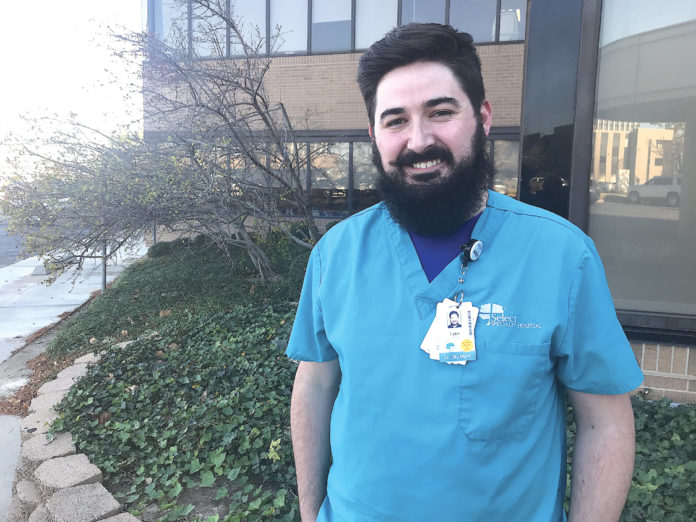
by James Coburn, Staff Writer
Select Specialty Hospital nurses are challenged to save people’s lives both day and night in the war against COVID-19.
“It’s really great to see them step up, because these patients are a lot sicker than any that we’re used to taking care of,” said Tyler Grantham, chief nursing officer.
“It’s been a transition to deal with these sicker patients and not have the support with it. I mean we’ve had to go through nursing shortages across Oklahoma, but the patient populations have just gotten higher.”
Some of the patients feel like they’re going to die, Grantham said. Being able to see them recover and leave the hospital makes the whole hospital feel they’ve made a difference, said Grantham, 29. (story continues below)

REGISTERED NURSES
Full-Time, Part-Time & PRN positions available
· Competitive Wages
· Comprehensive Benefits Program
Full-Time RN Sign-On Bonus: $3000-$7500
ACCEPTING ALL APPLICANTS AT THIS TIME!
JOIN OUR TEAM
www.cedarridgebhs.com/careers
The long-term acute care hospital specializes in caring for critically ill patients. Patients who are transferred there have been hospitalized in a hospital ICU for at least three days, said Select Specialty spokeswoman Tracy Cain.
The 72-bed, free-standing hospital has 12 dedicated ICU beds for critically ill patients on endotracheal tubes, vents, and different types of drips. There are 60 regular floor beds. Best practices include vent management, weaning, tracheotomies, wound care, physical therapy, occupational therapy, speech, and cognitive therapies.
Nurses and therapists get patients walking, talking, breathing, thinking, and eating again. An average hospitalization time is 25 days or more. Patients are prepared to make the transition to home health, a rehab or skilled nursing facility. Referrals are accepted from all of the different hospitals in the Oklahoma City metropolitan area as well as other parts of the state.
“We deliver the same level of care that you can get at one of the major hospitals in Oklahoma City,” Grantham said. “We have a longer time frame to get it done. Instead of a week for a few days to get someone off a ventilator we have an average of 25 days. We’re able to work with the patient a little more. It’s that longer time that kind of gives us that advantage of being able to see them come in so sick, but also walking out of here, too.”
He first came to Select Specialty as a nursing student before being hired there as an ICU nurse who worked his way up to nurse manager and the director of quality.
Grantham entered health care to make difference every day he goes to work.
He earned his Bachelor in the Science of Nursing degree at Langston University, followed by receiving a Master of Science in Health Care Administration at Oklahoma State University.
The majority of COVID-19 patients are older than 65, however Select Specialty accepts patient as young as 18. To say that patients are excited to leave the hospital is an understatement. They arrive worn out from the struggle.
“You see a lot of relief in the patient and the family being able to see that they’re progressing in getting back to that normal life,” Grantham said.
Nurses have had to adapt to life with the pandemic as well. At first there was a lot of fear of the unknown among the nursing staff, Grantham said.
“I don’t want to say it’s turned normal yet, but it’s kind of turned into ‘this is what we’re dealing with,’” he continued. “We’ve had to adapt to the situations. Nurses are obviously good at adapting to situations in general.”
Nurses learned all the personal protective equipment guidelines quickly while caring for a new type of patient. But being the caring hands that rescue lives from COVID-19 puts nurses at risk for disease that is more contagious than influenza, according to the Centers of Disease Control and Prevention.
Oklahomans have always been willing to help one another during a crisis. Nurses will be less likely to contract COVID-19 if Oklahomans spend more time at home, avoid large social gatherings, wear a mask in public, and by washing their hands often, Grantham said.
“Really to protect the nurses is to be able to minimize the number of patients we have come into the hospitals,” Grantham emphasized. “So, if it’s a controlled number of patients it’s going to be a lot easier to manage.”
Nurses arrive at work every day without complaints, he added. Nurses compensate by working extra shifts, working overtime, and by still meeting the challenge of staying safe and healthy.
“When you are faced with this amount of patients coming your way — you have to protect yourself,” said Parfait Fobasso, RN. “This is the time that if you are a nurse, you have to be proud to be a nurse.”












